STATEHOUSE REPORT | ISSUE 22.33 | Aug. 18, 2023
BIG STORY: Broadband expands across rural South Carolina
LOWCOUNTRY, Ariail: A warm bucket of spit
COMMENTARY, Brack: On a liquor liability law and our right to know
SPOTLIGHT: Charleston Animal Society
MY TURN: Instant runoff voting could fix broken election system
MYSTERY PHOTO: What in the world?
FEEDBACK: Send us your thoughts
Broadband expands across rural South Carolina
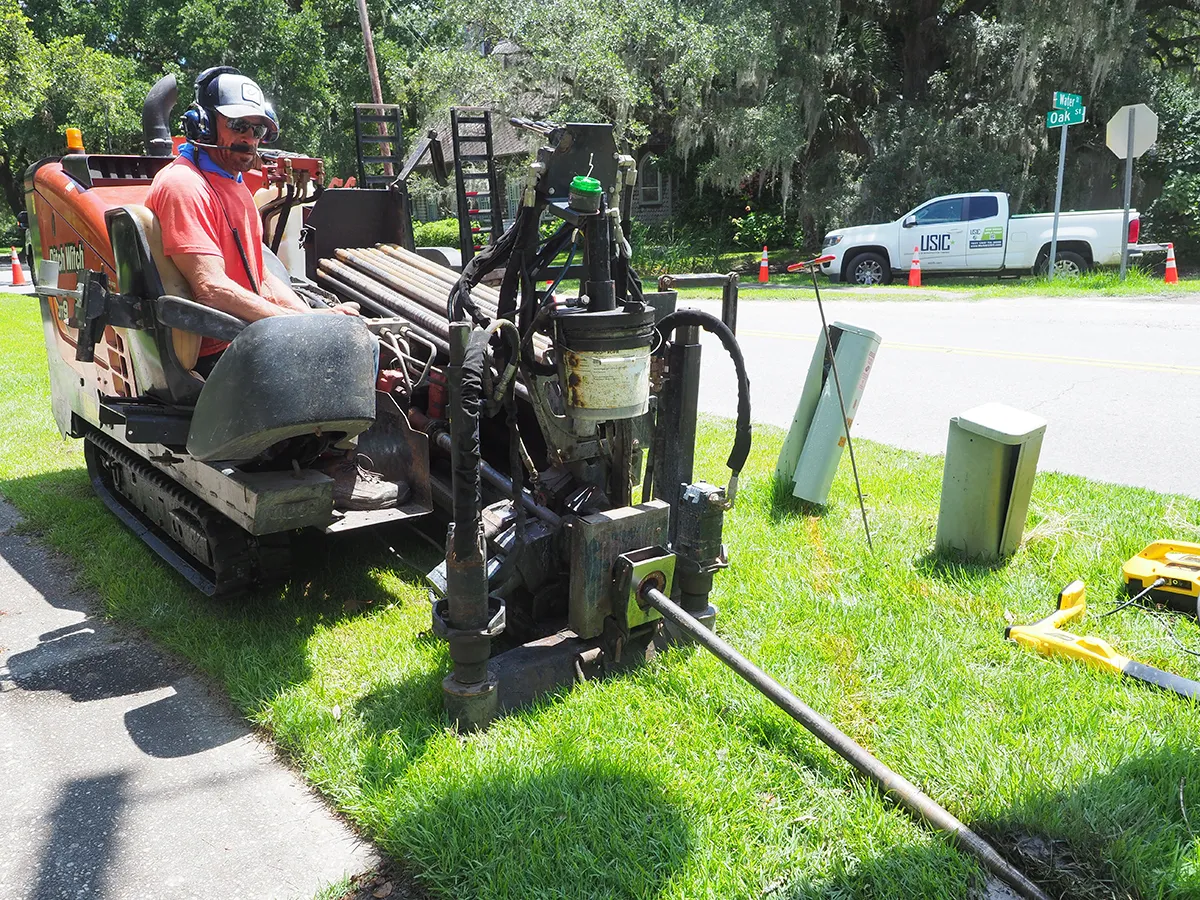
By Herb Frazier | The roar of drilling machines across rural areas of the Berkeley-Charleston-Dorchester county region signals more households, offices and eventually community centers are being connected to high-speed broadband service.
Thanks to federal funding, South Carolina has made “digital inclusion” a priority to bring fast, reliable and affordable internet service to an estimated 2 million households in underserved rural communities with an emphasis on children.
Elaine Morgan, CEO of the Berkeley County Chamber of Commerce, said educational achievement data show “our children didn’t do so well” stuck at home during the pandemic with no internet access.
“We have to do everything in our power to help them regain lost time and keep them on a steady path of learning,” she told the Charleston City Paper. Linking more homes in underserved areas to the digital information highway is one solution, she stressed.
Earlier this summer, South Carolina received a $551 million allocation in federal money to lay fiber optic cable for broadband expansion. The money comes from the Infrastructure Investment and Jobs Act (IIJA) that President Joe Biden signed in November 2021.
The state estimates it will receive the IIJA money in the first quarter of 2025, said Jim Stritzinger, director of the S.C. Broadband Office.
To receive the funds, South Carolina must first submit by Aug. 28 a five-year Broadband Equity Access and Deployment (BEAD) Action Plan to the National Telecommunications and Information Administration (NTIA), which is a part of the U.S. Department of Commerce.
In May 2022, the Broadband Office received from the American Rescue Plan its first allocation of $400 million. So far, the state has committed $150 million of that allocation to award grants to 15 internet service providers in 34 counties to make it financially feasible to run costly fiber optic lines to more homes and businesses.
At a recent meeting of the S.C. Broadband Advisory Council, Stritzinger said 191,548 households statewide had no internet service as of March 31. As broadband service spreads, that number is expected to be cut by some 58,000 households before the end of the year, he said.
Included in that figure are some 31,000 students who lack internet access at home. The Broadband Office has made students a priority, and it is making investments that should cut that number in half by December 2024, he explained.
The investment is paying off around Awendaw in Charleston County, said town councilman Robert A. Causey Sr., a Home Telecom customer who got faster internet access to replace a slow analog system.
“Everybody in the town was complaining about the internet service,” he said. “It has really helped us [to recruit] people considering moving to Awendaw,” he said.
Spreading the word
 Charleston native Mignon Clyburn, a Washington, D.C., consultant to broadband and technology companies and former commissioner on the Federal Communications Commission, said, “We can lay down all the fiber, erect all the poles, sponsor hundreds of open houses and sign-up drives, but if those who would benefit from being connected the most are not included, then we would have spent a lot of money building technology bridges to … only to a privileged few. That is for me the biggest challenge, but it is among the simplest to address.”
Charleston native Mignon Clyburn, a Washington, D.C., consultant to broadband and technology companies and former commissioner on the Federal Communications Commission, said, “We can lay down all the fiber, erect all the poles, sponsor hundreds of open houses and sign-up drives, but if those who would benefit from being connected the most are not included, then we would have spent a lot of money building technology bridges to … only to a privileged few. That is for me the biggest challenge, but it is among the simplest to address.”
To make rural broadband expansion successful, Home Telecom in Moncks Corner has partnered with the Berkeley County Chamber of Commerce to educate people why the internet has become an essential part of life, said Gina T. Shuler, the company’s vice president of marketing
Morgan, the Berkeley Chamber’s CEO, added that a lot of people think they don’t need the internet. That’s why the chamber is trying to teach people how the service can connect them to a doctor, apply for a job, write a resume and send an email.
With grants from Google and chamber members, Morgan said the chamber has plans to upgrade five Berkeley County community centers with computers, low-cost Chromebooks, free internet connections and Wi-Fi. With the digital connection, she said, residents can access mental health and drug and alcohol treatment services.
“We’ve found that people in rural areas … don’t get the correct information, and they don’t get the information on time,” she said. By the end of the year, volunteers, called digital navigators, will begin training residents on how to access and use the technology.
Examples: Upgrades are planned at the Keith School Community Center in Cainhoy, the Alvin Recreation Center in Alvin, the Cross Community Center, the Tri Community Center in Sandridge and the Wassamassaw Community Center near Jedburg.
With an initial investment of $150,000, the chamber plans to open five upgraded community centers. Six more centers are expected later. Centers will be spaced 15 to 20 miles apart in Berkeley County, the state’s largest county, she said.
“We are a county of haves and have-nots,” Morgan said. “We want every resident … to enjoy the successes of Berkeley County. Residents ought to make a living wage and have all the basic needs and access to the agencies” that provide vital social and medical services. Broadband expansion, she added, “is a good road to make the changes we need.”
Herb Frazier is senior projects editor at the Charleston City Paper. Have a comment? Send to: feedback@charlestoncitypaper.com
A warm bucket of spit
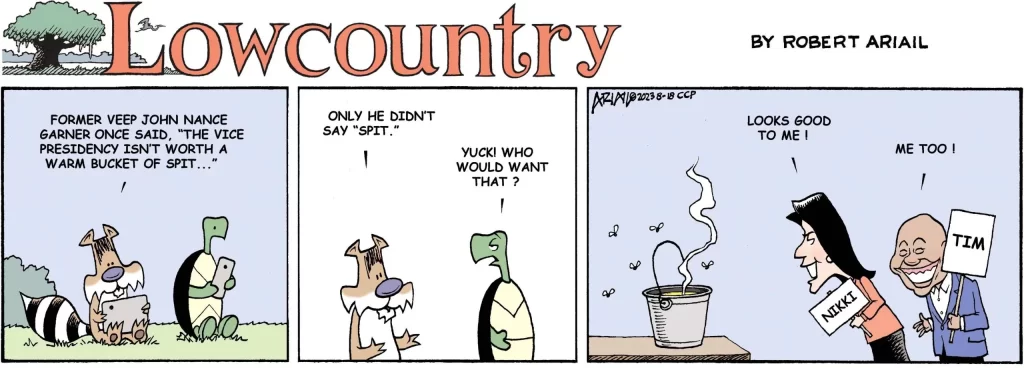
Award-winning cartoonist Robert Ariail generally has a biting or funny comment about the great state of South Carolina in his weekly cartoon. This week, he blends the whole concept of global warming with the surreal art of Salvador Dali. Love the cartoon? Hate it? What do you think: feedback@statehousereport.com.
On a liquor liability law and our right to know
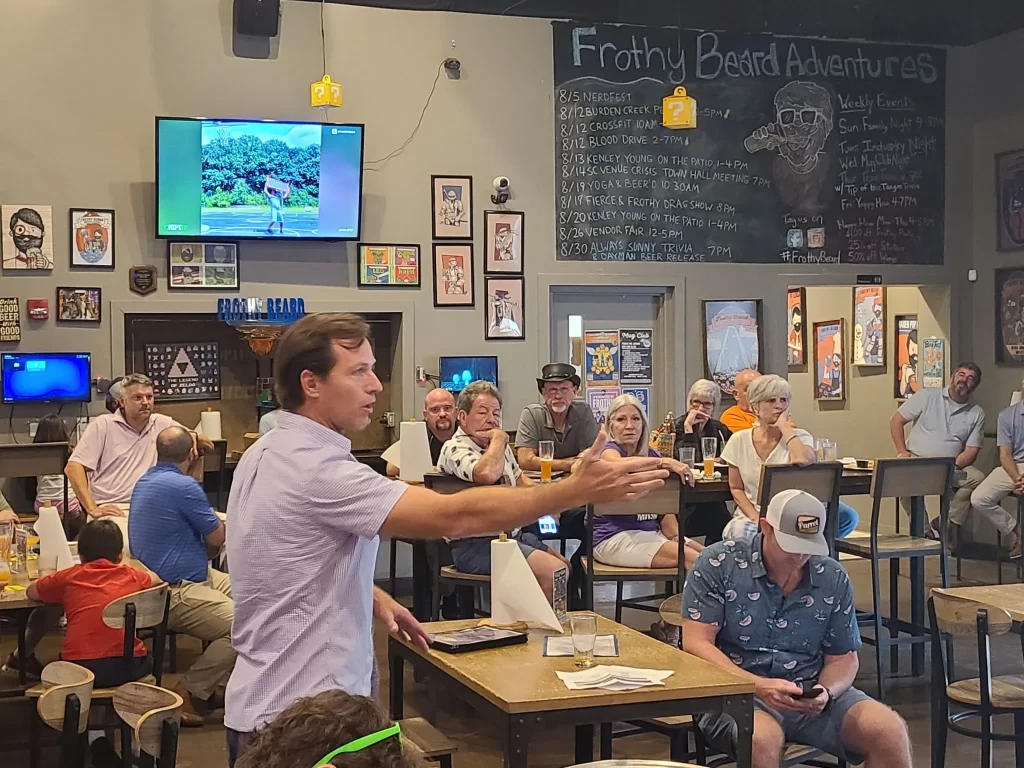
By Andy Brack | You might have missed this, but it could impact your pocket if you ever go into a local bar, restaurant or entertainment joint that serves drinks after 5 p.m.
 Skyrocketing rates for liquor liability insurance are threatening to shutter some bars and entertainment venues. A state law that passed in 2017 requires all bars, restaurants and venues that serve alcohol after 5 p.m. to carry a $1 million liability insurance policy. But critics say because the measure is missing key language to prevent it from being exploited by insurance companies, business owners are vulnerable to sky-high lawsuits and inflated rates.
Skyrocketing rates for liquor liability insurance are threatening to shutter some bars and entertainment venues. A state law that passed in 2017 requires all bars, restaurants and venues that serve alcohol after 5 p.m. to carry a $1 million liability insurance policy. But critics say because the measure is missing key language to prevent it from being exploited by insurance companies, business owners are vulnerable to sky-high lawsuits and inflated rates.
One Charleston bar owner told us how his establishment’s annual premium rose from $17,000 to $47,000 in the last four years. And at one American Legion post on James Island, operators had to raise drink prices 25% to cover insurance rate hikes. (That would mean a veteran’s $4 beer now costs $5.)
Upstate resident Asheton Reid of the group S.C. Venue Crisis says it’s normal for bars to have liability insurance, but the new law is missing language that establishes rules to split fault based on the percentage of responsibility related to a lawsuit. “Even if you are just 1% at fault, you can be held responsible for $1 million,” she said. “These frivolous lawsuits in the wake of S. 116 [the new law] have caused spikes in insurance rates. In 2017, we had at least 12 insurance providers, and now we’re down to three in just a few years.”
This is a problem that can be fixed. Two lawmakers introduced bills late last session to address the issue, but they didn’t really have time to get traction. And with the General Assembly not meeting again until January, we hope bars and venues under the oppressive law can survive and not go under.
Also in the news recently is a story from a small Kansas town that’s related to the public’s right to know what’s behind a sketchy episode.
On Aug. 11, police and sheriff’s deputies in Marion County, Kansas, raided the office of The Marion County Register in searches prompted by a restaurant owner’s complaint claiming identity theft of records that were legally obtained and verified by the newspaper, which decided to not publish a story. Even more curious: The newspaper was looking into the newly hired police chief’s past for a possible different story.
The Kansas judge who signed off on what one outlet called a “Gestapo-style” raid of the newspaper office and the homes of the publisher and the town’s vice mayor, apparently was unaware that subpoenas, not search warrants, are proper for authorities who want information from the media, In recent days, a local prosecutor withdrew the warrant and ordered seized items to be returned.
But what’s truly tragic over and above trampling of freedom of the press guaranteed in the Bill of Rights is that the publisher’s 98-year-old mother, a former editor at the paper, died the day after the raid, still stunned about what happened. A local coroner concluded the stress of questionable searches contributed to her death.
Our constitution guarantees freedom of speech and freedom of the press. As outlined this week in a tough editorial in the Charleston City Paper, our media have “the vital social responsibility to publish truthful, objective information without restraint or censorship. That way, voters can make good decisions about public officials, elected and hired, and how they are running government in a civilized society. Fundamental duties of this ‘Fourth Estate’ are to serve as a watchdog for a heavy — or light — hand of government and to offer a vibrant marketplace for ideas to stimulate society.
“What happened in Kansas last week was a fundamental corruption of American freedom.” Nip these abominations in the bud so they don’t spread.
Andy Brack, editor and publisher of the Charleston City Paper and Statehouse Report, last week was named first-place winner for political columns in the 2023 national contest by the Association of Alternative Newsmedia. Have a comment? Send to: feedback@statehousereport.com.
Charleston Animal Society
 We’re pleased today to shine our spotlight on the Charleston Animal Society, leader in the effort to make Charleston County a safe place for animals. Now the society is working to expand its Charleston success statewide to energize the state to reshape its 300-plus shelters and animal organizations into a no-kill network that stretches from Walhalla to Little River to Daufuskie Island.
We’re pleased today to shine our spotlight on the Charleston Animal Society, leader in the effort to make Charleston County a safe place for animals. Now the society is working to expand its Charleston success statewide to energize the state to reshape its 300-plus shelters and animal organizations into a no-kill network that stretches from Walhalla to Little River to Daufuskie Island.
Safe and healthy communities, neighborhoods and families don’t just happen – they’re built. “No Kill – No Harm – No More” shines a spotlight on animal abuse and family violence, which are often perceived and treated as separate issues. However, animal abuse is often the tip of the iceberg to larger issues in the home, such as child abuse, elder abuse or domestic violence.
- South Carolina’s most honored charity four years in a row
- National model for success
- Southeast’s only AAHA-accredited combined clinic and shelter
- Focused on solving problems rather than reacting to them year after year
- Publishes Carolina Tails, the largest pet magazine in S.C.
- No Kill. No Harm. No More. is a “movement” comprised of two major initiatives: No Kill Charleston and No Kill South Carolina.
- Learn more about the Charleston Animal Society and its work to create a network of humane network for the animals that bring joy to our lives.
Instant runoff voting could fix broken election system

By Nicole Sanchez | We have all seen extreme partisanship in Washington, D.C. We’ve begun seeing it trickle down to the state and local levels.

I think most South Carolinians agree with me that the rhetoric is more harmful than helpful. Nothing is black and white. Shades of gray permeate every corner of our lives. Every day we are further divided by the echo chambers created by social media and biased news sources that make us more focused on national politics rather than what is happening in our own backyards.
Our political system pushes us to the extremes with campaign finance laws reminiscent of the Wild West, and a first-past-the-post voting system that incentivizes the poor behavior that perpetuates polarization. First-past-the-post, or plurality voting, means that whoever gets the most votes wins. While that seems democratic on the surface, there are issues. For example, if there is a crowded field like North Charleston’s upcoming mayoral election, candidates can win with far less than 50% of the vote. That incentivizes candidates to tear down their opponents and radicalize their base.
Fixing the system
While many of these issues are difficult to tackle, there is already a bill in the Statehouse that could fix our broken first past the post election system: H. 4022, which will allow municipalities to use instant runoff voting.
Instant runoff voting (also known as ranked choice voting) allows voters to rank their choices. This simple change can save municipalities the cost of a traditional runoff while still ensuring majority support. Additionally, IRV provides another valuable benefit to our voting system – changing the way that candidates campaign. Obviously, a candidate wants to be a voter’s first choice, but instant runoff voting (IRV) allows a voter to fully articulate how they feel about all their options by ranking them. With IRV, candidates will be incentivized to talk to voters who already support their opponents because the rankings are important in a crowded field and can lead to a win.
Advantages of instant runoffs
In the past, I’ve canvassed for candidates. If I saw someone else’s sign in the yard, I skipped them. They have clearly made their decision and I am unlikely to sway them with a five-minute pitch. On the other hand if IRV were in place, I could knock on their door and tell them about how our two candidates have some stances in common and that we would appreciate their second place vote. IRV encourages real conversations and bridge building. It encourages candidates to reach beyond their base. Strong candidates win with IRV instead of letting weak candidates squeak by with a plurality or through a poorly attended runoff.
IRV also discourages mudslinging. Since candidates want you to rank them, they need to appeal to their opponent’s voters as well. In races where IRV is already in use, we’ve seen candidates focus on their positive vision for their constituency rather than demeaning their opponents. Voters won’t rank a candidate who is attacking their top pick.
How it works
Also, IRV is simple to use. We’ve been ranking things for as long as we can remember and this is no different. Voters simply rank the candidates that they choose in the order that they prefer them. When votes are being counted, the candidate with the least amount of votes is eliminated and anyone who picked them first has their second choice activated. This process is repeated until a candidate achieves a majority of votes.
To try this out, readers can visit www.BetterBallotSC.org/polls. We have unscientific IRV Presidential Primary Polls to see how the system works first hand with current candidates.
Nicole Sanchez is the president of Better Ballot SC, a nonprofit organization dedicated to the education of South Carolinians about instant runoff voting. Have a comment? Send to: feedback@statehousereport.com.
What in the world?
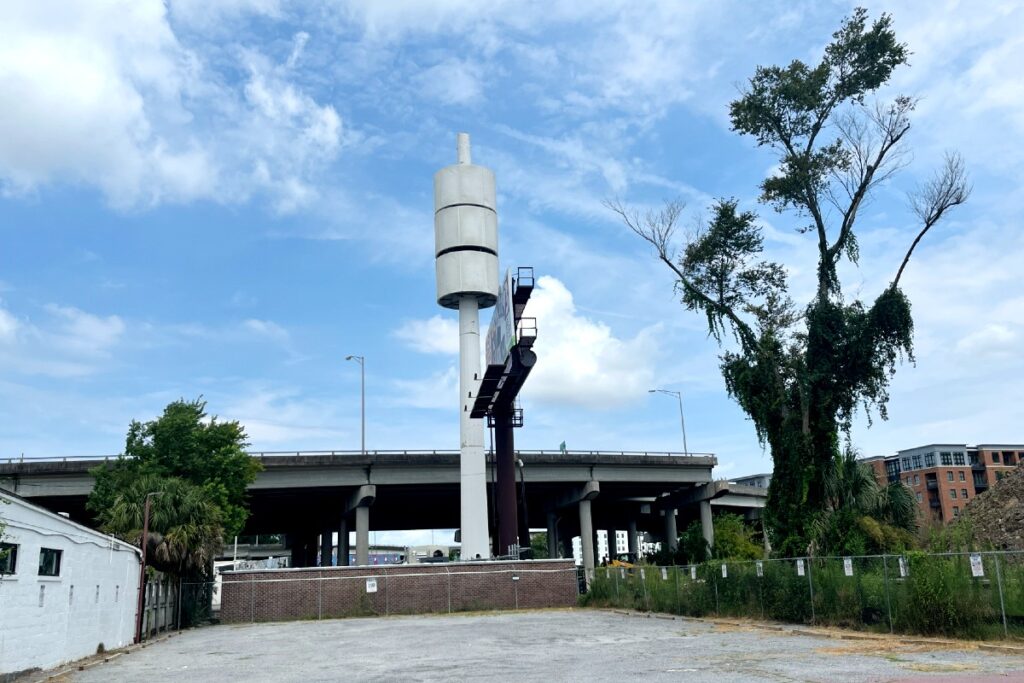
What in the world is this odd-looking structure and where is it? Can you tell us anything odd about it? Send us your guess of what this photo shows – as well as your name and hometown – to feedback@statehousereport.com.
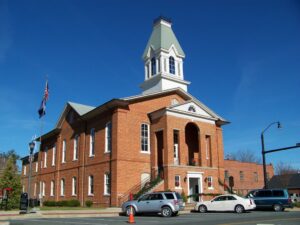 Last week’s “Is it a church?” wasn’t a church, as longtime sleuth George Graf of Palmyra, Va., noted in identifying it as the old courthouse in Chesterfield County. The building now serves as the county’s visitors’ center and museum.
Last week’s “Is it a church?” wasn’t a church, as longtime sleuth George Graf of Palmyra, Va., noted in identifying it as the old courthouse in Chesterfield County. The building now serves as the county’s visitors’ center and museum.
Bill Segars of Hartsville wrote that the pictured building was at least the third courthouse for the county. “This Second Empire building was built in 1884 with an addition in 1937. It replaced the Robert Mills courthouse that was burned by Union troops on March 2, 1865. Robert N. McGrath is credited with the plans for this building, but it’s thought to be a revision of Robert Mill’s plans for the 1827 Chesterfield County’s courthouse. This courthouse was used until 1978 when the new and present courthouse was built.”
Others who correctly identified the courthouse were: Allan Peel of San Antonio, Texas; Jacie Godfrey of Florence; Steve Willis of Lancaster; David Lupo of Mount Pleasant; Elizabeth Jones and Dot Rogers, both of Columbia; and Frank Bouknight of Summerville.
>> Send us a mystery picture. If you have a photo that you believe will stump readers, send it along (but make sure to tell us what it is because it may stump us too!) Send to: feedback@statehousereport.com and mark it as a photo submission. Thanks.
Send us your thoughts
We encourage you to send in your thoughts about policy and politics impacting South Carolina. We’ve gotten some letters in the last few weeks – some positive, others nasty. We print non-defamatory comments, but unless you provide your contact information – name and hometown, plus a phone number used only by us for verification – we can’t publish your thoughts.
- Have a comment? Send your letters or comments to: feedback@statehousereport.com. Make sure to provide your contact details (name, hometown and phone number for verification. Letters are limited to 150 words.
- ORDER NOW: Copies are in Lowcountry-area bookstores now, but if you can’t swing by, you can order a copy online today.
- Now available as an e-book!
ABOUT STATEHOUSE REPORT
Statehouse Report, founded in 2001 as a weekly legislative forecast that informs readers about what is going to happen in South Carolina politics and policy, is provided to you at no charge every Friday.
- Editor and publisher: Andy Brack, 843.670.3996
Donate today
We’re proud to offer Statehouse Report for free. For more than a dozen years, we’ve been the go-to place for insightful independent policy and political news and views in the Palmetto State. And we love it as much as you do.
But now, we can use your help. If you’ve been thinking of contributing to Statehouse Report over the years, now would be a great time to contribute as we deal with the crisis. In advance, thank you.
Buy the book
Now you can get a copy of editor and publisher Andy Brack’s We Can Do Better, South Carolina! ($14.99) as a paperback or as a Kindle book ($7.99). . The book of essays offers incisive commentaries by editor and publisher Andy Brack on the American South, the common good, vexing problems for the Palmetto State and interesting South Carolina leaders.
More
- Mailing address: Send inquiries by mail to: P.O. Box 21942, Charleston, SC 29413
- Subscriptions are free: Click to subscribe.
- We hope you’ll keep receiving the great news and information from Statehouse Report, but if you need to unsubscribe, go to the bottom of the weekly email issue and follow the instructions.
- Read our sister publication: Charleston City Paper (every Friday in print; Every day online)
- © 2023, Statehouse Report, a publication of City Paper Publishing, LLC. All rights reserved.


